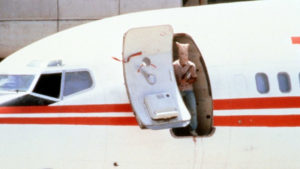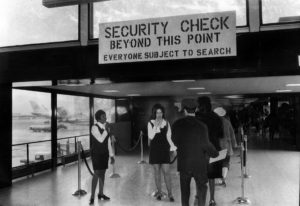
One of the inescapable sad facts about human society is that the actions of an infinitesimally small group of dysfunctional individuals will invariably impact the 99.99% of those of us who behave ourselves.
Flying has become an integral part of our lives. Our parents grew up with the concept of getting on a train to get somewhere far away. It was natural for the Boomer generation to adopt the airplane as its no-brainer method of getting somewhere, especially in light of competitive airfares that seem to steadily get more affordable.
That means regularly subjecting ourselves to walking through metal detectors. It means having our carried items subjected to X-radiation. It means having perfect strangers rifle through our most personal items. It means surrendering our Leathermans and pocket knives that we may have inadvertently forgotten to pack in our checked luggage, never to see them again. It means getting viewed as potential hijackers by stern airport security personnel until we successfully pass shoelessly through the devices that proclaim us to be otherwise.
We don’t like it, but we accept it as the price we have to pay, thanks to the actions of a few idiots. But if you remember JFK, you also remember when you went to the airport, purchased your ticket, and walked onto the plane.
On July 16, 1948, an attempt to hijack a seaplane flying out of the nation of Macau ended with the plane crashing into the sea. Thus took place the first hijacking of a commercial plane.

Hijacking planes remained a sporadic phenomenon until 1968. That year, a shocking 27 attempts were made to hijack airliners to Cuba. Why did people commandeer airliners to fly to the communist nation? That’s a question that has puzzled me for years. In the case of one man, Black Panther William Lee Brent, it was done to avoid a murder trial.
Hijackings continued to increase in 1969. Palestinians saw them as a way to further their cause and force Israel to release prisoners whom they viewed as unjustly confined. And unlike typical Cuban hijackings, the Palestinian versions would frequently end in tragedy.
Hijackings became more and more popular as the 1970’s progressed. In 1971, D.B. Cooper threatened the lives of the passengers on a 727 and managed to get $200,000 in cash. He then parachuted out of the plane over Oregon and was never seen again.
The crimes of piracy showed no sign of decreasing, and finally, in 1972, the first metal detectors were installed in airports. The tunneled structures were very confusing to passengers who were not used to being searched for weapons. Lawsuits were filed questioning the legality of the procedure, claiming it violated the Fourth Amendment against illegal searches and seizures. But the courts upheld it, and preflight security checks became a part of our culture.
Every time some madman decides to make a statement by hijacking or destroying an airliner, the rules get tougher. Despicable monsters take over planes with box cutters, now we can’t carry pocketknives. A dipwad turns his shoe into a bomb, now we have to walk through security in our socks.
It’s sad, but it’s the price we pay. A tiny minority of sociopaths can have a huge influence on the way the rest of us well-behaved ones are treated. But those of us old enough to remember JFK can recall a simpler time when you could walk straight from the ticket counter to the airplane, with no searches in between.